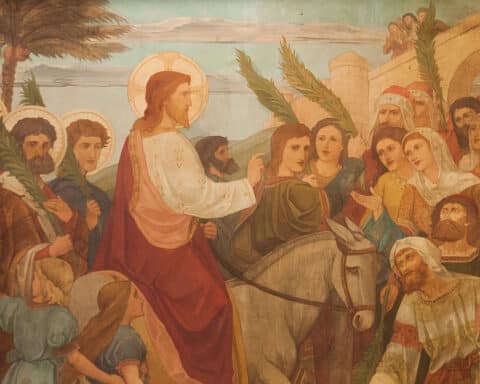
This question of John’s stands in contrast to his confession of faith at the beginning of the Gospel of John. Matthew’s John has but a partial vision of Jesus’ identity. The evangelist implies that John doesn’t even hear the voice of the Father, proclaiming Jesus as the beloved Son.
In the Gospel of John, there’s no such confusion. John the Baptist promises a baptism to come, not merely of water. He sees Jesus approaching him, announcing him as the Lamb of God who takes away the sins of the world. John hears the voice of the Father. There is no confusion on the part of the Baptist.
| Jan. 19 – Second Sunday in Ordinary Time |
|---|
|
Is 49:3, 5-6
Ps 40:2, 4, 7-8, 8-9, 10
1 Cor 1:1-3
Jn 1:29-34
|
How can there be two Johns, so different, within the Gospels? A literal or historical analysis of the text would tell a story about the early Church’s understanding of John the Baptist. In the first century, there was a potential rivalry between John the Baptist and Jesus. Matthew downplays John the Baptist’s recognition of Jesus, because this rivalry is still fresh. For the author of the Gospel of John, this rivalry has faded away. John the Baptist becomes the one who testifies entirely to the coming of Jesus.
Perhaps there’s something to this historical hypothesis. Maybe there was an early rivalry between those who receive John’s baptism and the disciples of Jesus.
At the same time, Catholics do not read the Scriptures looking only for traces of historical clashes between early Christians and Jewish reform movements. The complete Scriptures are inspired, even when there is a seeming contradiction.
In other words, how can our two Johns breath into the Church new life, inspiring those of us who are disciples of Our Lord to see anew the Lamb of God?
Christian experience unfolds between the two Johns. Each week, we attend the holy Mass, listening to the sacred Scriptures, receiving Christ’s Body and Blood. And yet to an outside observer, nothing special happens. At the most gorgeous Mass, with inspired music and incense rising to the heavens, it is not immediately evident that God is present among us.
Even to the most devout believer, it sometimes takes effort to recognize God’s presence. When our loved one is suffering from sickness, when we dip into the social discord and violence omnipresent in our age, we might be tempted to ask, like John, “Jesus, are you really the one?”
And yet part of the Christian experience is John’s recognition that Jesus is the Lamb of God. The experience of darkness does not erase this confession of John’s. It is his fidelity to righteousness, to the Word made flesh, that testifies to the beloved presence of the Lamb of God. His death is a witness to the truth.
In the end, we’re exactly like John. We have beheld the glory of God in the sacraments, in the sacred Scriptures, in the hungry and thirsty in our midst. And yet we have also suffered the darkness of ecclesial scandal and of a loveless age drunk on power and prestige. We have suffered from illness, sickness and death.
Like John, we can cry out to Jesus, asking him to identify himself as the Messiah, to make his presence known not only in sign but in act. And we can announce the belovedness of the Lamb of God by remaining faithful to Jesus, even in the darkness.
John’s confession, when it has force and when it fumbles, is ours, too!
Timothy P. O’Malley, Ph.D., is the director of education at the McGrath Institute for Church Life at the University of Notre Dame.





